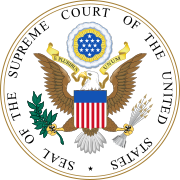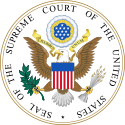List of United States Supreme Court cases, volume 10
| Supreme Court of the United States | |
|---|---|
 | |
 | |
| 38°53′26″N 77°00′16″W / 38.89056°N 77.00444°W | |
| Established | March 4, 1789 |
| Location | Washington, D.C. |
| Coordinates | 38°53′26″N 77°00′16″W / 38.89056°N 77.00444°W |
| Composition method | Presidential nomination with Senate confirmation |
| Authorised by | Constitution of the United States, Art. III, § 1 |
| Judge term length | life tenure, subject to impeachment and removal |
| Number of positions | 9 (by statute) |
| Website | supremecourt |
| This article is part of a series on the |
| Supreme Court of the United States |
|---|
 |
| The Court |
| Current membership |
|
| Lists of justices |
|
| Court functionaries |
This is a list of cases reported in volume 10 (6 Cranch) of United States Reports, decided by the Supreme Court of the United States in 1810.[1]
Nominative reports
[edit]In 1874, the U.S. government created the United States Reports, and retroactively numbered older privately-published case reports as part of the new series. As a result, cases appearing in volumes 1–90 of U.S. Reports have dual citation forms; one for the volume number of U.S. Reports, and one for the volume number of the reports named for the relevant reporter of decisions (these are called "nominative reports").
William Cranch
[edit]Starting with the 5th volume of U.S. Reports, the Reporter of Decisions of the Supreme Court of the United States was William Cranch. Cranch was Reporter of Decisions from 1801 to 1815, covering volumes 5 through 13 of United States Reports which correspond to volumes 1 through 9 of his Cranch's Reports. As such, the complete citation to, for example, Field v. Holland is 10 U.S. (6 Cranch) 8 (1810).
Justices of the Supreme Court at the time of 10 U.S. (6 Cranch)
[edit]The Supreme Court is established by Article III, Section 1 of the Constitution of the United States, which says: "The judicial Power of the United States, shall be vested in one supreme Court . . .". The size of the Court is not specified; the Constitution leaves it to Congress to set the number of justices. Under the Judiciary Act of 1789 Congress originally fixed the number of justices at six (one chief justice and five associate justices).[2] Since 1789 Congress has varied the size of the Court from six to seven, nine, ten, and back to nine justices (always including one chief justice).
When the cases in 10 U.S. (6 Cranch) were decided, the Court comprised these seven justices:
| Portrait | Justice | Office | Home State | Succeeded | Date confirmed by the Senate (Vote) |
Tenure on Supreme Court |
|---|---|---|---|---|---|---|

|
John Marshall | Chief Justice | Virginia | Oliver Ellsworth | January 27, 1801 (Acclamation) |
February 4, 1801 – July 6, 1835 (Died) |

|
William Cushing |
Associate Justice | Massachusetts | original seat established | September 26, 1789 (Acclamation) |
February 2, 1790 – September 13, 1810 (Died) |

|
Samuel Chase |
Associate Justice | Maryland | John Blair, Jr. | January 27, 1796 (Acclamation) |
February 4, 1796 – June 19, 1811 (Died) |

|
Bushrod Washington |
Associate Justice | Virginia | James Wilson | December 20, 1798 (Acclamation) |
November 9, 1798 (Recess Appointment) – November 26, 1829 (Died) |

|
William Johnson |
Associate Justice | South Carolina | Alfred Moore | March 24, 1804 (Acclamation) |
May 7, 1804 – August 4, 1834 (Died) |

|
Henry Brockholst Livingston |
Associate Justice | New York | William Paterson | December 17, 1806 (Acclamation) |
January 20, 1807 – March 18, 1823 (Died) |

|
Thomas Todd |
Associate Justice | Kentucky | new seat | March 2, 1807 (Acclamation) |
March 3, 1807 – February 7, 1826 (Died) |
Notable cases in 10 U.S. (6 Cranch)
[edit]Fletcher v. Peck
[edit]In Fletcher v. Peck, 10 U.S. (6 Cranch) 87 (1810), for the first time the Court held a state law to be unconstitutional (in Marbury v. Madison, 5 U.S. (1 Cranch) 137 (1803), the Supreme Court had for the first time held a federal law to be unconstitutional). The Court in Fletcher helped create a line of precedents supporting the sanctity of contracts, and hinted that Native Americans did not hold complete title to their own lands.
Tyler v. Tuel
[edit]In Tyler v. Tuel, 10 U.S. (6 Cranch) 324 (1810), the Court held that an assignee of a geographically limited patent right could not bring an action in the assignee's own name. It was the first published Supreme Court decision on patent law.[3][4] Like other Supreme Court patent cases prior to Evans v. Eaton, 16 U.S. (3 Wheat.) 454 (1818), however, it did not deal with substantive patent law, but only with the law of patent assignment.[5]
Citation style
[edit]Under the Judiciary Act of 1789 the federal court structure at the time comprised District Courts, which had general trial jurisdiction; Circuit Courts, which had mixed trial and appellate (from the US District Courts) jurisdiction; and the United States Supreme Court, which had appellate jurisdiction over the federal District and Circuit courts—and for certain issues over state courts. The Supreme Court also had limited original jurisdiction (i.e., in which cases could be filed directly with the Supreme Court without first having been heard by a lower federal or state court). There were one or more federal District Courts and/or Circuit Courts in each state, territory, or other geographical region.
Bluebook citation style is used for case names, citations, and jurisdictions.
- "C.C.D." = United States Circuit Court for the District of . . .
- e.g.,"C.C.D.N.J." = United States Circuit Court for the District of New Jersey
- "D." = United States District Court for the District of . . .
- e.g.,"D. Mass." = United States District Court for the District of Massachusetts
- "E." = Eastern; "M." = Middle; "N." = Northern; "S." = Southern; "W." = Western
- e.g.,"C.C.S.D.N.Y." = United States Circuit Court for the Southern District of New York
- e.g.,"M.D. Ala." = United States District Court for the Middle District of Alabama
- "Ct. Cl." = United States Court of Claims
- The abbreviation of a state's name alone indicates the highest appellate court in that state's judiciary at the time.
- e.g.,"Pa." = Supreme Court of Pennsylvania
- e.g.,"Me." = Supreme Judicial Court of Maine
List of cases in 10 U.S. (6 Cranch)
[edit]Notes and references
[edit]- ^ Anne Ashmore, DATES OF SUPREME COURT DECISIONS AND ARGUMENTS, Library, Supreme Court of the United States, 26 December 2018.
- ^ "Supreme Court Research Guide". Georgetown Law Library. Retrieved April 7, 2021.
- ^ Robert A. Matthews, Jr., 5 Annotated Patent Digest § 35:1, via Westlaw, retrieved 2014-12-30 ("perhaps the first published decision on a patent question by the Supreme Court").
- ^ Malla Pollack, The Owned Public Domain: The Constitutional Right Not to Be Excluded - or the Supreme Court Chose the Right Breakfast Cereal in Kellogg v. National Biscuit Co., 22 Hastings Comm. & Ent L.J. 265, 291 n119 (2000).
- ^ Harold C. Wegner, Post-Merck Experimental Use and the "Safe Harbor", 15 Fed. Circuit B.J. 1, 37 (2005).
See also
[edit]External links
[edit]- [1] Case reports in volume 10 (6 Cranch) from Court Listener
- [2] Case reports in volume 10 (6 Cranch) from the Caselaw Access Project of Harvard Law School
- [3] Case reports in volume 10 (6 Cranch) from Google Scholar
- [4] Case reports in volume 10 (6 Cranch) from Justia
- [5] Case reports in volume 10 (6 Cranch) from Open Jurist
- Website of the United States Supreme Court
- United States Courts website about the Supreme Court
- National Archives, Records of the Supreme Court of the United States
- American Bar Association, How Does the Supreme Court Work?
- The Supreme Court Historical Society


